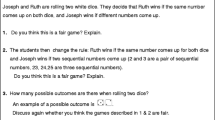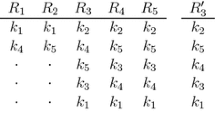Abstract
The importance of paradoxes with regard to the development of mathematics, in particular stochastics, is outlined in part 1. Part 2 deals with the relevance of paradoxes in learning processes, and a connection to Piaget’s equilibration theory is pointed out. Part 3 consists of some general statements regarding intuition and, further, of a list of 5 heuristic strategies which should promote intuitive enlightenment (gathering and making use of experimental data; modifying; finding analogues; sharpening and contrasting; approximating). In the main part 4, three examples of probabilistic paradoxes are discussed in greater detail (Birthday-problem; Drawing-lots-problem; Table-and-chair-problem). The systematic application of the above mentioned strategies is demonstrated.
Similar content being viewed by others
Literatur
Bauersfeld, H.: Subjektive Erfahrungsbereiche als Grundlage einer Interaktionstheorie des Mathematiklernens und -lehrens, in: Bauersfeld, H. u. a.: Lernen und Lehren von Mathematik, Aulis-Deubner 1983, S. 1–56
Bentz /Borovcnik: Probleme bei empirischen Untersuchungen zum Wahrscheinlichkeitsbegriff, in: Journal für Mathematikdidaktik 6 (1985), S. 241–264
Borovcnik, M.: Was bedeuten statistische Aussagen? Hölder-Pichler-Tempsky 1984
Danckwerts /Requate: Oszillierende Funktionen — eine Chance zur Stärkung der Intuition, in: Der Mathematikunterricht 32 (1986), S.44–51
Davis /Hersh: Erfahrung Mathematik, Birkhäuser 1985
Dedekind, R.: Was sind und was sollen die Zahlen? (1887), Vieweg 1969
Descartes, R.: Regeln zur Ausrichtung der Erkenntniskraft, (hrsg. von L. Gäbe), Meiner 1979
Dinges, H.: Schwierigkeiten mit der Bayesschen Regel, in: Mathematisch-Physikalische Semesterberichte 25 (1978), S. 113–156
Dörner, D.: Problemlösen als Informationsverarbeitung, Kohlhammer 1979
Duncker, K.: Zur Psychologie des produktiven Denkens, Springer 1966
Embrechts, P.: Zufall, Einführungsvorlesung an der ETH Zürich, Manuskript, Juli 1990
Engel, A.: Stochastik, Klett 1987
Engel /Varga /Walser: Zufall oder Strategie? Klett 1974
Erbrich, P.: Zufall — Eine naturwissenschafliche Untersuchung, Kohlhammer 1988
Evered, J. L.: Rezension des Buches „Innumeracy” von Paulos, in: The American Mathematical Monthly, 97 (1990), Nr. 1, S. 88–91
Feller, W.: An Introduction to Probability Theory and its Applications, J. Wiley & Sons 1968
Fischbein, E.: Probabilistic thinking in Children and Adolescents, in: Bechauf, R. (Hrsg.), Forschung zum Prozeß des Mathmatiklernens, IDM 1976, S. 23–42
Fischbein, E.: Intuition in Science and Mathematics, Reidei 1987
Fischbein /Gazit: Does the Teaching of Probability improve Probabilistic Intuition? in: Preceedings of the first international Conference on Teaching Statistics, Sheffield 1982, Vol. 2, S. 738–752
Freudenthal, H.: Mathematik als pädagogische Aufgabe, Bd. 2, Klett 1973
Galilei, G.: Unterredungen und mathematische Demonstrationen über zwei neue Wissenszweige, die Mechanik und die Fallgesetze betreffend (1638), Wissenschaftliche Buchgesellschaft 1985
Gilde /Altrichter: Seltsames um den gesunden Menschenverstand, Deutsch 1976
Glaymann /Varga: Zwischen Unmöglich und Sicher, Herder 1975
Green, D. R.: A Survey of Probability Concepts in 3000 pupils aged 11–16 Years, in: Proceedings of the first international Conference on Teaching Statistics, Sheffield 1982, Vol. 2, S. 766–783
Harten, von/Steinbring: Stochastik in der Sekundarstufe I, Aulis / Deubner 1984
Heitele, D.:Didaktische Ansätze zum Stochastikunterricht in Grundschule und Förderstufe, Diss. PH Ruhr, Dortmund 1976
Hussy, W. Denkpsychologie, 2. Band, Kohlhammer 1986
Jäger /Schupp: Stochastik in der Hauptschule, Schöningh 1983
Kahnemann /Tversky: Subjective probability: a judgement of representativeness, in: Cognitive Psychology 3 (1972). S. 430–454
Kahnemann /Tversky On the psychology of prediction, in: Psychological Review 80 (1973), S. 237–251
Kitaigorodski, A. Unwahrscheinliches -möglich oder unmöglich? Aulis-Deubner 1977
Kütting, H.: Didaktik der Wahrscheinlichkeitsrechnung, Herder 1981
Lakatos, I: Mathematik, empirische Wissenschaft und Erkenntnistheorie, Vieweg 1978
Laplace, P. S. de: Philosophischer Versuch über die Wahrscheinlichkeit (1814), Akadem. Verlagsgesellschaft 1932
Lorenz, K.: Vom Weltbild des Verhaltensforschers, dtV 1968
Mandelbrot, B. B.: Die fraktale Geometrie der Natur, Birkhäuser 1987
Meschkowski, H.: Mathematik als Grundlage, dtv Wiss. Reihe 1973
Meyer, U.: Klinische Interwiews und ihre Auswertung zu einer stochastischen Problemaufgabe als Beitrag zur beschreibenden Heuristik, Examensarbeit RWTH Aachen 1985
Morgenstern, D.: Didaktische Schwierigkeiten der Stochastik, in: Mathematisch-Physikalische Semesterberichte 25 (1978), S. 31–51
Moshovitz-Hadar /Hadass Preservice Education of Math Teachers using Paradoxes, in: Educational Studies in Mathematics 21 (1990), S. 265–287
Paulos, J. A.: Zahlenblind — Mathematisches Analphabetentum und seine Konsequenzen, Heyne 1990
Pfanzagl, J.: Elementare Wahrscheinlichkeitsrechnung, de Gruyter 1988
Pflug, G.: Paradoxien in der Wahrscheinlichkeitsrechnung, in: Dörfler /Fischer (Hrsg.): Stochastik im Schulunterricht, Hölder-Pichler-Tempsky 1981, S. 155–164
Piaget, J.: Psychologie der Intelligenz, Rascher 1948
Poincaré, H.: Wissenschaft und Hypothese, (1914), Wissenschaftliche Buchgesellschaft 1974
Renyi, A.: Briefe über die Wahrscheinlichkeit, Birkhäuser 1969
Renyi, A.: Wahrscheinlichkeitsrechnung, Deutscher Verlag der Wissenschaften 1971
Riemer, W.: Neue Ideen zur Stochastik, Bibliogr. Institut 1985
Scheid, H.: Stochastik in der Kollegstufe, Bibliogr. Institut 1986
Schneider, I. (Hrsg.): Die Entwicklung der Wahrscheinlichkeitstheorie von den Anfängen bis 1933, Wissenschaftliche Buchgesellschaft 1988
Scholz, R. W.: Stochastische Problemaufgaben — Analysen aus didaktischer und psychologischer Perspektive, IDM Bielefeld, Materialien und Studien — Band 23, 1981
Schräge, G.: Stochastische Trugschlüsse, mathematica didactica 7 (1984), S. 3–19a
Schräge, G.: Irrwege zur Stochastik, Mathematik lehren, H. 5, 1984, S. 50–53b
Schräge, G.: Ein Geburtstagsproblem, Mathematische Semesterberichte 37 (1990), S.251–257
Shaughnessy, J. M.: Misconceptions of Probability, in: Educational Studies in Mathematics 8 (1977), S. 295–316
Shaughnessy, J.M.: Misconceptions of Probability. Systematic and otherwise, in: Proceedings of the first international Conference on Teaching Statistics, Univerity Sheffield 1981, Vol. II, S. 784–801
Stadler, H.: Paradoxien der Wahrscheinlichkeitsrechnung, Teil 1 und 2, Didaktik der Mathematik 1986, S. 134–152, S. 167–182
Steinbring, H.: Zur Entwicklung des Wahrscheinlichkeitsbegriffes — Das Anwendungsproblem in der Wahrscheinlichkeitstheorie in didaktischer Sicht, Institut für Didaktik der Mathematik, Materialien und Studien Band 18, 1980
Székely, G. J.: Paradoxa. Klassische und neue Überraschungen aus Wahrscheinlichkeitsrechnung und mathematischer Statistik, Harri Deutsch 1990
Thom, R.: „Moderne” Mathematik: Ein erzieherischer und philosophischer Irrtum? in: Otte, M. u. a.: Mathematiker über die Mathematik, Springer 1974
Walter, H.: Stochastische Fehlvorstellungen, in: Dörfler-Fischer (Hrsg.): Stochastik im Schulunterricht, Teubner 1981, S. 265–268
Wertheimer, M.: Produktives Denken, Kramer 1964
Wickmann, D. Bayes-Statistik, Einsicht gewinnen und entscheiden bei Unsicherheit, Bibliographisches Institut 1990
Winter, H.: Entdeckendes Lernen im Mathematikunterricht, Vieweg 1989
Wittmann, E. Chr.: Objekte-Operationen-Wirkungen. Das operative Prinzip in der Mathematikdidaktik, in: Mathematik lehren H.11, 1985
Borovcnik, M.: Problemecke, in: Stochastik in der Schule, 11 (1991), H. 3, S. 46–51
Stewart, J.: Mathematische Unterhaltungen, Spektrnm der Wissenschaft, Heft 11, 1991, S. 12–16
Author information
Authors and Affiliations
Rights and permissions
About this article
Cite this article
Winter, H. Zur intuitiven Aufklärung probabilistischer Paradoxien. JMD 13, 23–53 (1992). https://doi.org/10.1007/BF03339376
Published:
Issue Date:
DOI: https://doi.org/10.1007/BF03339376




